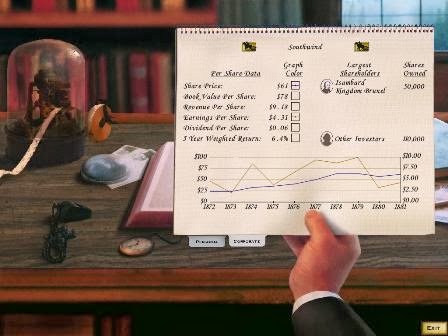It is rare that computer games have lessons to teach us, but the Railroad Tycoon has a number of lessons in wealth management to offer to us.
First of all, let me introduce what the Railroad Tycoon is all about. It is a game in which you set up a railroad company and build railroads linking cities and resources together and transporting resources among the cities. There is an objective for each game, which could be to achieve a certain wealth or connect 2 far away cities together by a certain year.
 |
| Building Rail Roads and Transporting Resources among Cities |
Besides building railroads and scheduling trains to run, Railroad Tycoon also has a stock market of all the railroad companies. Personally, you can buy and sell shares, including on margin. As the executive Chairman of your railroad company, you can also issue new shares or bonds or buy back them.
 |
| Stock Market in the Railroad Tycoon |
To keep the stock market realistic, Railroad Tycoon keeps a record of the company's balance sheets, income statements and cashflow statements for the past years. Here, you can carry out a financial analysis of the company if you wish.
 |
| Balance Sheet of the Company |
 |
| Income Statement of the Company |
 |
| Financial Statement of the Company |
The reason why Railroad Tycoon has wealth management lessons to offer is because you play the executive Chairman of the company, where you can make all the decisions from running the company to deciding what to do with the company's funds. So, it offers a glimpse of how companies in the real world are run. Here are some of the lessons I got from playing the Railroad Tycoon.
Lesson #1: To Be Successful in the Stock Market, Your Company Must First Be Well Run
To achieve the objectives in some games, it is necessary to play the stock market, such as buying shares on margin, attempting merger with a rival railroad company etc. However, in order to be successful in the stock market, it is important to be successful as a businessman first. If your railroad company is not well run, its share price will languish and you will face margin calls from the brokers. Conversely, if the railroad company is well run, its share price will increase, offering you greater margin to buy more shares of your own company or that of others.
Lesson #2: Boring Companies Can Be Very Profitable
In the game, besides transporting the resources produced by companies, you can also invest in them using the railroad company's money. So, the more resources you transport from that company, the more profitable it is. Boring companies, such as grain mills, cattle yards, sheep farms, etc. can actually be very profitable. The resources they produce do not need to undergo many processes and hence it is easier to make large profits from them. For example, you just need to transport the grains from the grain mill in City 1 to the bakery in City 2 to produce food for the people in City 3.
In contrast, "high-tech" companies (the game era can be as early as 1850s) like steel mills requires more resources and processes. It requires both coal and iron ore to produce steel to be manufactured into goods for the people. So, you need as many as 5 cities with the required resources to deliver the finished products. It is more difficult for the steel mill to be profitable.
Lesson #3: If One Company is Profitable, All in the Vertically Integrated Chain Can Be Profitable
From the previous section, you can see that companies can be vertically integrated together. By successfully integrating the related companies together (e.g. grain mill + bakery, or coal mine + iron mine + steel mill + tool & die factory) through the railroads and train services, all can be very profitable at the same time.
Lesson #4: Share Buy-Backs are Independent of Price
As an outsider in the real world, we often think that companies engage in share back-buys because they think that the share price is too low and does not reflect the actual worth of the company. In Railroad Tycoon, if your company is profitable, you can engage in share buy-backs as well. However, it is not always when the share price has fallen below the actual value when I engage in share buy-backs. I do so when the share price has fallen and there is increased risk of margin calls from the brokers. At other times, it might be to buy out the other shareholders using the company's cash. Sometimes, the company might be so profitable and you just want to get rid of the excess cash. So, even if the share price is on a high and there is no risk of margin calls, I would engage in share buy-backs. The share price does not really affect when I engage in share buy-backs. In fact, the higher the share price, the easier is the task of spending money! So, share buy-backs do not necessarily mean that the share price is low.
Conclusion
As small-time investors, we often do not know how companies in the real world are run. The Railroad Tycoon offers a chance to be the executive Chairman of a company. While not fully reflective of the real world, you get some valuable insights into how companies are run.
Wishing everybody a Merry Christmas :)
See related blog posts:
See related blog posts:
No comments:
Post a Comment